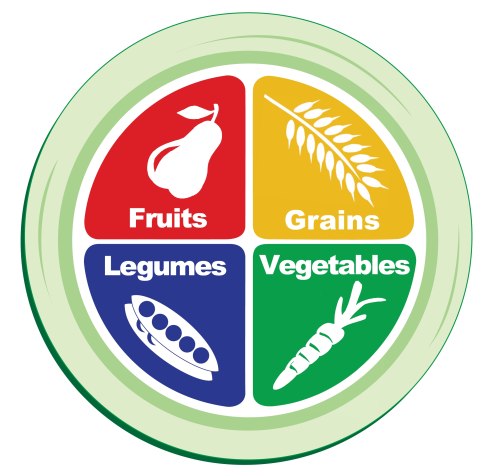
Do you still get all the minerals and vitamins that you get when eating meat and dairy?
YES. With one caveat: B12. (Click the link for more information on B12)
Let me also make a note that I have several friends — friends who eat meat with a side of meat — and they are B12 deficient. I also have friends who eat meat and dairy and have other deficiencies — vitamin D, anemia (iron), etc.
Point is, deficiencies can happen on any diet and are sometimes not related to diet. For example, my sister, regardless of the diet she eats, will always be anemic. We know this because she tried everything possible with food (including eating a lot of iron-rich meat before going plant-based) and nothing changed. (Read Courtney's post about iron and anemia).
I recommend everyone obtain a yearly physical that includes blood work to check for deficiencies, regardless of diet or lifestyle.
To end on a positive note, I have two friends who reversed their iron deficiencies when they adopted a plant-based diet :)
What about vitamin D?
Go outside! It's the sunshine vitamin. See this great video by Dr. McDougall about vitamin D.
Some of the best sources of calcium are plant-foods: sesame seeds, tofu, greens (like collard greens and spinach), asparagus, quinoa, herbs (like basil, thyme, and oregano), spices (like cinnamon, cumin, and cloves), green beans, oranges, Brussels sprouts, leeks, cabbage — just to name a few! (Source).
Interestingly, milk and dairy — which have long been touted as necessary for healthy bones — actually cause osteoporosis. (Source).
That's why in places like Asia, where milk and dairy is not widely consumed, there are little to no instances of osteoporosis, but in places like America, where women consume a lot of dairy, osteoporosis runs rampant.
Dairy is one of the biggest health offenders and is linked to numerous medical conditions — acne, prostate cancer, allergies, IBS (and other GI issues), type 2 diabetes, anemia in children, it raises estrogen and promotes growth hormones — just to name a few. If you can only give up one thing right now: Get off dairy.
More reading: Dr. Hyman's 6 Reasons You Should Avoid Dairy
Dr. McDougall: When Friends Ask: "Why Don't You Drink Milk?"

How much protein do I need?
Don't worry about protein! You could eat nothing but potatoes all day long and still exceed your protein needs. All foods contain protein, even kale and bananas. Spinach (which is 51% protein) also has more protein calorie for calorie than steak!
When was the last time you heard of someone being hospitalized for protein deficiency? Never. You cannot be protein deficient unless you are calorie deficient (meaning you're not eating enough calories — and in that case, you're deficient in everything).
Our bodies also need less protein than you might think. According to the World Health Organization (WHO), the average 150-pound male requires only 22.5g of protein daily based on a 2,000 calorie a day diet, meaning only 4.5% of calories should come from protein. (WHO recommends pregnant women get 6% of calories from protein). Other nutritional organizations recommend as little as 2.5% of calories from protein. Most Americans consume 20% or more.
Excess protein is also very taxing on the body, especially if that protein is animal protein (it has the same effect as milk, above, causing the body to leach calcium from your bones in order to neutralize the acidic effects of animal protein, thereby causing osteoporosis).
For more information: Can I get enough protein on a plant-based diet?
But I'm a runner/swimmer/cyclist/weight lifter — I still need extra protein, right?
NO! Even if you are an athlete or body builder you still do not need extra protein or need to take extra protein supplements. If you want to put on muscle, you just need to eat more calories (energy). The body builds muscle from calories (energy) — it doesn't matter where that calorie came from. Despite a widespread misconception, eating extra protein doesn't do much toward boosting your muscle mass and strength and remember: excess protein is harmful. (Source).
One of my closest friends is a body builder, and any time he needs to put on substantial muscle, say, for a competition, he eats a lot of food to put on weight first. As he says, he fattens himself up, so he can eventually turn that fat (extra calories — energy) into muscle.
High performance athletes need extra calories in general, but they do not need added concentrated sources of 'nutrition.'
For more information, see WebMD: Will Eating More Protein Help Your Body Gain Muscle Faster? Find out how consuming too much protein can harm your body.
If you are working out between 1-2 hours per day, you should not have to increase much in your diet. If you find yourself losing weight (and you don't want to), bump up your calories. There is no need to add any powder/shakes, etc.
Even if you still feel you need extra protein, eat whole foods to get it — not highly processed protein powders (most of which have weird artificial things added to them to make them somewhat palatable).
What is a "balanced" meal? What foods do I need to combine?
This is the beauty of eating a plant-based diet. Eating an array of whole plant foods means you don't have to worry about the details — your body does the math for you.
Some years ago, nutritionists were saying vegans needed to combine foods (such as beans and rice) in order to obtain so-called complete proteins. This has long been abandoned by the nutrition community, since we now know that's not true. The myths about having to combine foods to get the proper balance of nutrients has been long disproved, but like the protein myth, seems to carry on nevertheless. I won't get too scientific, but the short of it is: you don't have to eat beans and rice or nuts and grains or any combination at the same time. You just have to eat them, period. Not necessarily together. (Source)
That said, there are some foods that complement each other. For example, vitamin C increases iron absorption. (On the other hand, some studies have found calcium can inhibit iron absorption when the two are eaten together). Overall, I wouldn't worry too much about it unless you're anemic and then you should talk to your doctor about your options: supplement, trying to change your foods, etc.
If you still want to "balance" your meals, PCRM has a terrific power plate (it's interactive!) that may help.
Do taking digestive enzymes and probiotics really help?
You've got at least 1,000 different bacteria in your gut. All of those bacteria are in a balance. Taking a pill (or, eating say, a yogurt) with 8, or even 30 new ones isn't going to make a difference. What WILL make a huge difference is what you feed the ones you have. (Feed them well).
I also had a dreadful experience with probiotics that you can read about here.
For what it's worth, the European Food Safety Authority (Europe's "FDA") has rejected most claims made about probiotics, including that they help the digestive system, saying they are unproven. (Source)
More from the Herbies 101 series is on the way in upcoming weeks!














